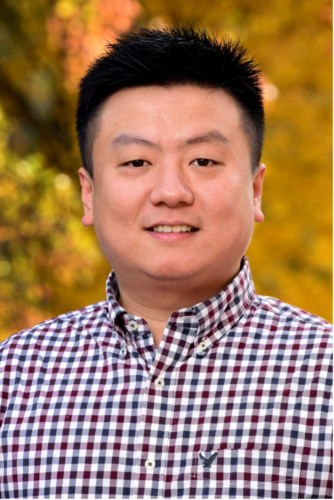Meet Dr. Xiaoqiu (Churchill) Wang
Written by Dr. Kamilah Grant and Dr. Dawit Tesfaye (SSR Diversity Committee) in honor of Asian American and Pacific Islander Heritage (AAPIH) Month
May is Asian American and Pacific Islander Heritage (AAPIH) month. The SSR Diversity Committee is participating in this celebration. For this, Dr. Kamilah Grant and Dr. Dawit Tesfaye (members of the SSR Diversity Committee) interviewed Dr. Xiaoqiu (Churchill) Wang from North Carolina State University. Enjoy the reading!

What is your current position, and what does it entail?
I am an Assistant Professor in the Department of Animal Science at North Carolina State University. I also serve as faculty in Comparative Medicine Institute (CMI), Biotechnology Program (BIT), and Center for Human Health and the Environment (CHHE) at NC State. I direct a research lab that focuses on mechanisms of blastocyst implantation and endometrial function during pregnancy, disease states, and aging. Besides research, I teach two advanced reproductive biology courses at graduate level and serve on several committees in both department and college levels.
Can you talk a little bit about yourself, where are you from? What first attracted you to the world of science? And how did you get to be in your current position?
I was born and raised in China. My journey into science began with a childhood immersed in musical art. Through playing piano and other instruments, I discovered patterns, harmony, and structure. This sparked a curiosity that led me to see the connections between music and science – both require attention to detail and a love for uncovering patterns. That’s why I was drawn to science – it’s a way to explore the beauty and complexity of the universe with the same passion and rigor as in music. I completed my B.Sc. and first Ph.D. in the field of Nutrition at China Agriculture University in Beijing, where I explored the impacts of intrauterine growth restriction (IUGR) on gut development. Pursuing the concept of fetal origin of adult disease (FOAD), I undertook a second Ph.D. training in Physiology of Reproduction at Texas A&M University (TAMU), a renowned hub of reproductive biology research. Here, under the guidance of Drs. Fuller W. Bazer and Guoyao Wu, I studied uterine capacity, the roles of histotroph on conceptus trophectoderm development, and pregnancy recognition signaling in sheep and pigs. These experiences provided a strong foundation in genomic, molecular, and cellular analyses to assess genetic and environmental contributions to basic cellular processes. After completing my second Ph.D., I pursued an IRTA postdoctoral fellowship in mouse genetics at the National Institute of environmental health sciences (NIEHS) under the mentorship of Dr. Francesco J. DeMayo. During this time, I contributed significantly to identifying SOX17 and FOXO1 as two critical transcription factors required for uterine receptivity and discovered a novel uterine-specific enhancer (Ihh19) using CRISPR/Cas technology. In the fall of 2018, I established my independent lab at North Carolina State University.
What are you most excited to do this year?
This year, I am really pumped to see how our ongoing research projects pan out. We have put in a lot of work, and I am itching to see the results. Plus, we have got some new projects lined up that just got funded, and I can’t wait to dive into those. On top of that, we are in the process of hiring some fresh faces into the team – we are looking to hire two postdocs, two PhD students, and a lab research technician. It’s an exciting time, and I am eager to see how our team grows and what we can achieve together.
Are there ways in which you think your heritage has affected your perspective or career trajectory?
Growing up in Chinese culture, surrounded by artistic expression, with a stage actor mother and a violist father, I developed a deep appreciation for creativity and discipline. My musical pursuits on the piano and other instruments further enriched my understanding of creativity, attention to detail, and perseverance, which are valuable traits in scientific research.
What words of inspiration would you like to share with the future generation of scientists, especially those coming from diverse backgrounds?
Embrace your uniqueness and cultural heritage, as they are like the diverse branches of a tree, each contributing to its strength and resilience.
Persistence is key. The path of science is rarely easy, but persistence and resilience will carry you through the toughest challenges. Keep pushing forward, even when faced with setbacks. In the words of Confucius, “It does not matter how slowly you go as long as you do not stop”. Your journey as a scientist may be long and winding, but every step forward, no matter how small, brings you closer to your goals. Be like the bamboo, bending but not breaking in the face of adversity, and let the winds of change propel you forward, just as they do the windmills.
Build bridges! Science thrives on collaboration and diversity of thought. Forge connection within and beyond your scientific community. Collaborate across disciplines, cultures, and backgrounds to tackle complex scientific problems with diverse perspectives. Never eat alone! Together, we can achieve so much more.
Finally, happiness is the absence of the striving for happiness. Find joy in the pursuit if knowledge and the beauty of discovery. Embrace each moment, learn from every experience. Your journey as a scientist is not just about personal success – it’s about making a positive impact on the world and inspiring others to follow in your footsteps.

